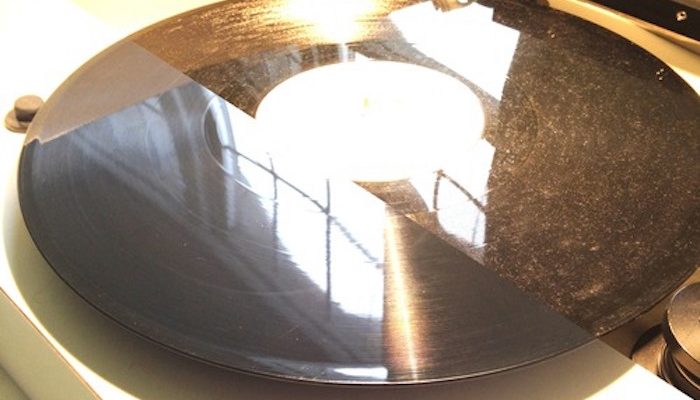This is adapted from a lengthy post I put on my record collecting blog, Vinyl Answer, which you can find on both Instagram and Tumblr.
One of the best parts of record collecting is The Find—that awesome moment when you find a record you’ve just gotta have. That’s what happened at a flea market the other day when I found this 12″ remix of Digital Underground’s hip-hop classic, “The Humpty Dance.” It’s funny and funky, but this copy was filthy! Look at all that dust and dirt, plus those smudges on the grooves? That was mold growing on it, just like the pizza in the back of your fridge. Yecch!

Look at all that garbage on there! Never put a record like that on your turntable, because not only will it sound awful, but it’ll mess up your needle, so it’ll make your other records sound bad, too.
Here’s the thing about cleaning records: The more money you spend, the smaller and more imperceptible the differences will be. You can spend nearly $7,000 on a Keith Monks record cleaning machine (RCM), and I’m sure it’ll do a great job, but it will only be moderately better than the cleaning that a $750 Music Hall record cleaning machine will do, which in turn is only moderately better than an $80 Spin-Clean, so you get the idea. Is there a difference? Yes, absolutely—a flea-market record cleaned by a Monks will sound a lot better than a Spin-Cleaned one any day. Is it worth spending $7,000? Buddy, if you have the money for a Monks, why are shopping in flea markets?
I can tell you this much: Your best return on investment is to get a good, quality record cleaning brush for $15-30. A good brush and some patience will get about 70 percent of the results that an RCM will get, and if you’re not super picky about your sound, that’s all you need. If you’re just starting out collecting, don’t drive yourself crazy wishing you could save up for an RCM—just get a brush, use it and be happy. If you wind up becoming a serious record collector, then yeah, you’ll want to up your game at some point; it took me a few decades, so again, no rush.

A Hunt brush is generally considered the best brush for cleaning your records; it runs $30 and will get most of the dust and crud out of your vinyl. I have two of them—a Hunt and this one in the photo, the Milty Super Exstatic, which is the same exact brush but with a different name silkscreened on it. Avoid the crummy RCA Discwasher kits—they just push the dirt around on your record. As you can see in the photo above, it got a lot of dust out of the grooves—it’s all piled up in that wavy gray line—but if you look closely on the vinyl, the mold was still there.

So I took the record up to my attic and slapped it on my RCM. I own a VPI 17.5, which I don’t think they make any more. I bought it used for $300 from my favorite used record store when they upgraded to a VPI Typhoon. That was more than I wanted to spend, but an opportunity is what it is, so look on Craigslist and your local classifieds first—you might find a deal.
You can clean a record by hand just as well as a machine—it’s just a tool for doing it faster and more consistently. In the photo, cleaning fluid is on the record, and a brush is gently scrubbing up the muck in the grooves while the turntable spins. If you’re cleaning records in your sink by hand, use cleaning fluid and a brush (not the Hunt brush), go with the grooves and not against them, and then use distilled water to rinse. Here’s some great advice on recording cleaning methods from an outfit that makes record cleaning fluid; I don’t use their stuff, but their philosophy about cleaning records is very down to earth.

Here’s the end result—a much cleaner record that I can actually play without ruining my needle. This photo also shows what RCMs can’t do, because you can see there’s still blemishes and surface-level scratches. No amount of cleaning will fix a nasty scratch; that sounds obvious, but it’s a truth. Some records are just beyond salvage.
This one, though, sounds great and I’m done with writing ‘cause I gotta go do the humpty dance. (Do the hump, do the humpty hump, c’mon and do the humpty hump!)

